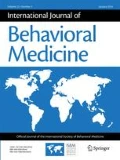Abstract
Background
There is evidence that positive personality characteristics, such as optimism and self-esteem, are important for health. Less is known about possible determinants of positive personality characteristics.
Purpose
To test the relationship of optimism and self-esteem with insomnia symptoms and sleep duration.
Method
Sleep parameters, optimism, and self-esteem were assessed by self-report in a community-based sample of 1,805 adults aged between 30 and 84 years in the USA. Moderation of the relation between sleep and positive characteristics by gender and age as well as potential confounding of the association by depressive disorder was tested.
Results
Individuals with insomnia symptoms scored lower on optimism and self-esteem largely independent of age and sex, controlling for symptoms of depression and sleep duration. Short sleep duration (<6 h) was related to lower optimism and self-esteem when compared to individuals sleeping 7–8 h, controlling depressive symptoms. Long sleep duration (>9 h) was also related to low optimism and self-esteem independent of age and sex.
Conclusion
Good and sufficient sleep is associated with positive personality characteristics. This relationship is independent of the association between poor sleep and depression.
References
John U, Meyer C, Rumpf H-J, Hapke U. Relationships of psychiatric disorders with sleep duration in an adult general population sample. J Psychiatr Res. 2005;39:577–83.
Meisinger C, Heier M, Löwel H, et al. Sleep duration and sleep complaints and risk of myocardial infarction in middle-aged men and women from the general population: the MONICA/KORA Augsburg cohort study. Sleep. 2007;30:1121–7.
Stranges S, Dorn JM, Cappuccio FP, et al. A population-based study of reduced sleep duration and hypertension: the strongest association may be in premenopausal women. J Hypertens. 2010;28:896–902.
Buysse DJ, Angst J, Gamma A, Ajdacic V, Eich D, Rössler W. Prevalence, course, and comorbidity of insomnia and depression in young adults. Sleep. 2008;31:473–80.
National Sleep Foundation. Executive summary of the 2002 sleep in America poll. http://www.sleepfoundation.org/sites/default/files/2002SleepInAmericaPoll.pdf Accessed June 7, 2011; 2002.
Fredriksen K, Rhodes J, Reddy R, Way N. Sleepless in Chicago: tracking the effects of adolescent sleep loss during the middle school years. Child Dev. 2004;75:84–95.
Lemola S, Räikkönen K, Scheier MF, et al. Sleep quantity, quality and optimism in children. J Sleep Res. 2011;20:12–20.
Haack M, Mullington JM. Sustained sleep restriction reduces emotional and physical well-being. Pain. 2005;119:56–64.
Rasmussen HN, Wrosch C, Scheier MF, Carver CS. Self-regulation processes and health: the importance of optimism and goal adjustment. J Pers. 2006;74:1721–47.
Orth U, Robins RW, Roberts BW. Low self-esteem prospectively predicts depression in adolescence and young adulthood. J Pers Soc Psychol. 2008;95:695–708.
Giltay EJ, Geleijnse JM, Zitman FG, Hoekstra T, Schouten EG. Dispositional optimism and all-cause and cardiovascular mortality in a prospective cohort of elderly Dutch men and women. Arch Gen Psychiatr. 2004;61:1126–35.
Li RHY, Wing YK, Ho SC, Fong SYY. Gender differences in insomnia—a study in the Hong Kong Chinese population. J Psychosom Res. 2002;53:601–9.
Radler BT, Ryff CD. Who participates? accounting for longitudinal retention in the MIDUS National Study of Well-being. J Aging Health. 2010;22:307–31.
Scheier MF, Carver CS, Bridges MW. Distinguishing optimism from neuroticism (and trait anxiety, self-mastery, and self-esteem): a re-evaluation of the life orientation test. J Pers Soc Psychol. 1994;67:1063–78.
Rosenberg M. Society and the adolescent self-image. Princeton: Princeton University Press; 1965.
Kessler RC, Andrews A, Mroczek D, et al. The World Health Organization Composite International Diagnostic Interview Short-Form (CIDI-SF). Int J Methods Psychiatr Res. 1998;7:171–85.
Aiken LS, West SG. Multiple regression: testing and interpreting interactions. Thousand Oaks: Sage Publications Inc; 1991.
Buckley TM, Schatzberg AF. On the interactions of the hypothalamic-adrenal (HPA) axis and sleep: normal HPA axis activity and circadian rhythm, exemplary sleep disorders. J Clin Endocrinol Metab. 2005;90:3106–14.
Pruessner JC, Hellhammer DH, Kirschbaum C, et al. Low self-esteem, induced failure and the adrenocortical stress response. Personal Individ Differ. 1999;27:477–89.
Acknowledgments
This research was supported by a grant from the MIDUS Pilot Grant Competition, National Institute on Aging, USA, to M. Allemand. The publication is based on data from the MIDUS Study, funded by the John D. and Catherine T. MacArthur Foundation Research Network on Successful Midlife Development and the National Institute on Aging (P01-AG020166).
Conflicts of interest
None.
Author information
Authors and Affiliations
Corresponding author
Rights and permissions
About this article
Cite this article
Lemola, S., Räikkönen, K., Gomez, V. et al. Optimism and Self-Esteem Are Related to Sleep. Results from a Large Community-Based Sample. Int.J. Behav. Med. 20, 567–571 (2013). https://doi.org/10.1007/s12529-012-9272-z
Published:
Issue Date:
DOI: https://doi.org/10.1007/s12529-012-9272-z

